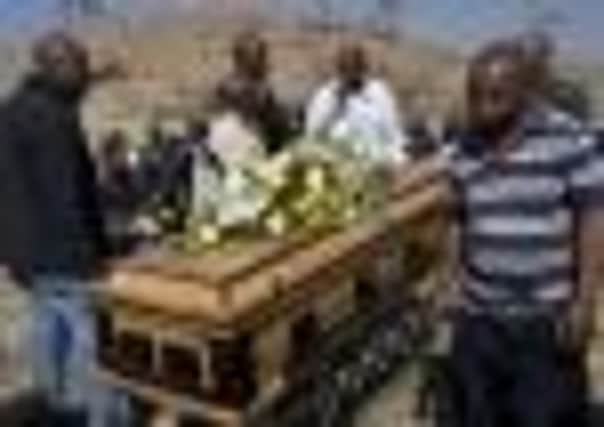South African prosecutors rebuked for charging miners with murder


The charge was enacted using old, apartheid-era legislation which allows for those who confront armed police to be held responsible for the outcome, but Jeff Radebe said yesterday that the decision had caused “shock, panic and confusion”.
The miners arrested for public violence following the strikes at the UK-listed Lonmin, whichculminated in the shooting of 34 strikers by police on 16 August, appeared in court on Thursday.
Advertisement
Hide AdAdvertisement
Hide AdA spokesman for the National Prosecution Authority (NPA) said they could collectively be held responsible because their actions as a group provoked the police to open fire.
However, the decision has been almost universally condemned by people on all sides of the debate, which has gripped South Africa from the moment that news footage showing the miners being gunned down was broadcast.
A spokesman for Mr Radebe said that despite the sensitivity surrounding the case, the NPA was independent and he had not been consulted.
Yesterday the minister stepped into the row, saying he had made an urgent request to the director of public prosecutions to explain his rationale.
“There is no doubt that the NPA’s decision has induced a sense of shock, panic and confusion within the members of the community and the general South African public,” he said.
“It is therefore incumbent upon me to seek clarity on the basis upon which such a decision is taken in my capacity as minister of justice under whose department the NPA falls.”
Legal commentators suggested that the NPA move was either a deliberate bid to shift the blame away from the authorities for the tragedy, or a clumsy attempt to keep the miners in custody until ringleaders could be found, by lawyers who failed to appreciate the political fall-out.
Pierre de Vos, an expert in constitutional governance at the University of Cape Town, said the move was “shameful” and unlikely to pass legal muster once the court hearing resumed.
Advertisement
Hide AdAdvertisement
Hide Ad“The NPA have acted with fear, favour and prejudice to advance some or another political agenda, further eroding the little trust South Africans might still have left in them,” he said.
The Council for the Advancement of the South African Constitution (CASAC) suggested that acting national director of public prosecutions, Nomgcobo Jiba, should lose his job.
“It is beyond doubt that the NPA are acting in a partisan manner, favouring the SAPS [South African Police Service] and the executive branch of government,” it said.
Julius Malema, the expelled former president of the ANC’s youth league who wants to see South Africa’s mines nationalised and has blamed president Jacob Zuma’s administration for failing to address the discontent that led to the strikes, said the NPA move was “madness”. Meanwhile Cosatu, the main South African union which is in alliance with the ruling ANC, said the NPA decision “jumped the gun” on the public inquiry set up by president Zuma to look into the Marikana massacre, so dubbed by the local media after the town closest to the platinum mine.